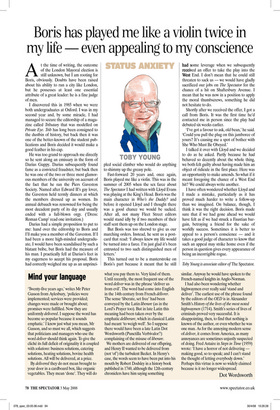Boris has played me like a violin twice in my life — even appealing to my conscience
At the time of writing, the outcome of the London Mayoral election is still unknown, but I am rooting for Boris, obviously. Doubts have been raised about his ability to run a city like London, but he possesses at least one essential attribute of a great leader: he is a fine judge of men.
I discovered this in 1985 when we were both undergraduates at Oxford. I was in my second year and, by some miracle, I had managed to secure the editorship of a magazine called Tributary that was modelled on Private Eye. Trib has long been consigned to the dustbin of history, but back then it was one of the better-known of the student publications and Boris decided it would make a good feather in his cap.
He was too grand to approach me directly so he sent along an emissary in the form of Darius Guppy. Darius subsequently found fame as a convicted fraudster, but back then he was one of the two or three most glamorous members of the university on account of the fact that he ran the Piers Gaveston Society. Named after Edward II’s gay lover, the Gaveston held termly dinners at which the members dressed up as women. Its annual debauch was renowned for being the most decadent party of its day and usually ended with a full-blown orgy. (‘Dress: Roman Camp’ read one invitation.) Darius had a simple proposition to put to me: hand over the editorship to Boris and I’ll make you a member of the Gaveston. If I had been a more high-minded undergraduate, I would have been scandalised by such a blatant bribe, but Boris had the measure of his man. I practically fell at Darius’s feet in my eagerness to accept his proposal. Boris had correctly weighed me up as an unprinci pled social climber who would do anything to shimmy up the greasy pole.
Fast-forward 20 years and, once again, Boris played me like a violin. This was in the summer of 2005 when the sex farce about The Spectator I had written with Lloyd Evans was playing at the King’s Head. Boris was the main character in Who’s the Daddy? and before it opened Lloyd and I thought there was a good chance we would be sacked. After all, not many Fleet Street editors would stand idly by if two members of their staff sent them up on the London stage.
But Boris was too shrewd to give us our marching orders. Instead, he sent us a postcard that read: ‘I always knew my life would be turned into a farce. I’m just glad it’s been entrusted to two such distinguished men of letters.’ This turned out to be a masterstroke on Boris’s part because it meant that he still ome leverage when we subsequently ved an offer to take the play into the End. I don’t mean that he could still threaten to sack us — we would have gladly sacrificed our jobs on The Spectator for the chance of a hit on Shaftesbury Avenue. I mean that he was now in a position to apply the moral thumbscrews, something he did not hesitate to do.
Shortly after we received the offer, I got a call from Boris. It was the first time he’d contacted me in person since the play had debuted six weeks earlier.
‘I’ve got a favour to ask, old bean,’ he said. ‘Could you pull the plug on this jamboree of yours? It’s causing me a spot of bother with She Who Must Be Obeyed.’ I talked it over with Lloyd and we decided to do as he asked. Partly because he had behaved so decently about the whole thing, we both felt guilty about having made him an object of ridicule in the first place. Here was an opportunity to make amends. So what if it meant foregoing the chance of a West End hit? We could always write another.
I have often wondered whether Lloyd and I made a mistake, particularly as it has proved much harder to write a follow-up than we imagined. On balance, though, I think it was the right decision. Boris made sure that if we had gone ahead we would have felt as if we had struck a Faustian bargain, betraying a friend for the sake of worldly success. Sometimes it is better to appeal to a person’s conscience — and it takes a good judge of character to know that such an appeal may strike home even if the person in question gives every appearance of being an incorrigible rogue.
Toby Young is associate editor of The Spectator.


















































































 Previous page
Previous page